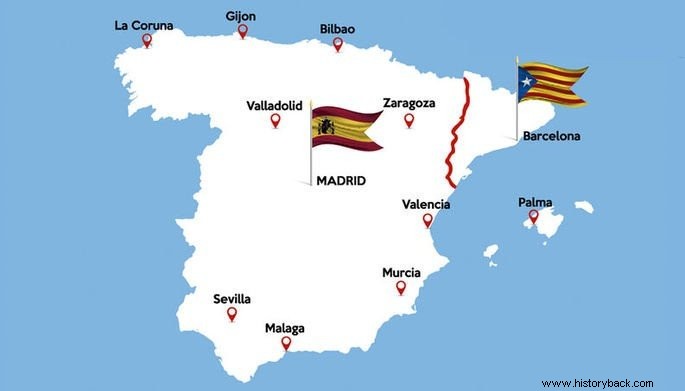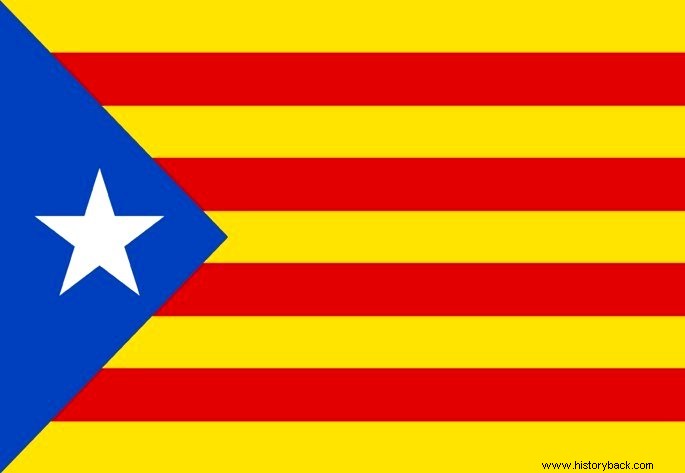The independence of Catalonia is a movement that aims to establish a country in the region of Catalonia, which is currently in Spain.
Various attempts at separation from Spain, often through war, have been made by Catalans throughout history.
In the 21st century, however, the population has sought to conquer sovereignty through political means, through referendums.
Movement for the separation of Catalonia
The movement for the separation of Catalonia, a Spanish region, has intensified in recent years.
Despite being an old desire, it is in the 21st century that we observe a great mobilization on the part of the political class and the population to promote Catalan independence.

In 2006, politicians in that region managed to approve the Statute of Autonomy that included the term "nation". This Statute would be challenged by the Spanish Constitutional Court, which declared that some of its articles were unconstitutional.
Later, several cities began to hold popular consultations on Catalan independence. This encouraged the population and politicians to hold a referendum on the region's independence.
In the face of protests from the Spanish central government, the Catalan government changed the status from referendum to "popular consultation". In 2014, although banned by the central government, thousands of people went to the polls and confirmed that they wanted an independent Catalan state.
With the success of this consultation, on October 1, 2017 another referendum was held, with the participation of 42% of the electorate.
The Spanish Constitutional Court ruled this action illegal and the president of the government, Mariano Rajoy (1955), ordered the police to confiscate and close several polling stations. Unfortunately, several violent actions by the police forces were recorded.
More than two million people are believed to have voted and 43% have chosen the "yes" option. However, these numbers could never be effectively verified, as they lack official support.
Declaration of independence of Catalonia
In view of the results of the popular consultation, the president of Catalonia, Carlos Puigdemont (1962), declared it an independent state.
However, during the same speech, he stated that the effect would not be immediate, as more time was needed to make the region an independent country. At the time, no country or international organization recognized Catalonia as a sovereign state.
The president of the Spanish government (prime minister), Mariano Rajoy, intervened in Catalonia immediately, suspending the local parliament and calling for elections.
Several political leaders were arrested for illegally carrying out a political act, tried and sentenced to prison in October 2019. On the other hand, some leaders, such as Puigdemont, left Catalonia claiming that they did not have sufficient democratic guarantees for a fair trial.
The condemnation of Catalan politicians generated a wave of protest on the part of the citizenry.
Why does Catalonia want to secede from Spain?
There are several reasons why Catalonia wants to be an independent country.
Below we list three of them:
Historical reasons
Catalonia was once a region that enjoyed autonomy and would only be recovering what was taken from it.
They also claim the right of self-determination of peoples to decide on their political destiny. This thesis was used especially in the 20th century, during the process of African decolonization.
Cultural reasons
Some Catalans tend to see Spanish culture as the culture of Castile, the region that conquered them, and thus consider it foreign.
Proof of this is that Catalonia has its own language, Catalan, which reinforces the notion that they are "different" from the rest of Spain.
Financial reasons
Catalonia is Spain's third richest region and argues that it contributes more than it receives from the central government. Thus, she feels wronged because she contributes more money and does not see it return to her benefit.
With independence, all resources would stay in Catalonia and would be managed by the Catalans themselves, solving the problem.
See also:What is Nationalism?History of Catalonia

Part of Catalonia existed as an autonomous state during the Middle Ages. Later, it would be incorporated into the Kingdom of Aragon as a county, but always retaining its autonomy.
Later, the county is incorporated into the Kingdom of Castile and the quarrels are reborn. This story changes when the Habsburg dynasty ends and a new king is appointed to take over the kingdom of Spain. After the War of Succession (1701-1714), Philip V, of the Bourbon family, takes over.
All this was resolved with the signing of the Treaty of Utretch in 1713, which guaranteed peace in Spain and Europe.
The Catalans, however, did not support Philip de Bourbon and fought against his enthronement. However, he managed to win the war and in 1714, when Felipe V (1683-1746) took the throne of Spain, Catalan institutions were abolished and the Catalan language was banned.
See also:Treaty of Utrecht (1713)Catalunya in the 20th century
With the proclamation of the Second Republic, in Spain, in 1931, the Catalans took the opportunity to separate themselves from Spain, but they returned to achieve a differentiated status within the country.
After the Spanish Civil War (1936-1939), Catalonia lost any specificity within Spain. In addition, General Francisco Franco (1892-1975) determines the ban on Catalan symbols and the teaching of Catalan in schools.
It was only with the return of democracy, in 1975, that the issue of separation from Catalonia returned with force within Spanish politics.
Basque Country and Catalonia
Another Spanish region that wants to form an independent state is the Basque Country.
For years, especially from the 1970s onwards, several protesters used violence to try to break up. One of the main groups was ETA, which carried out attacks, kidnappings and extortion to achieve its objectives.
See also:ETA:all about the Basque separatist group Keep searching. There are more texts on this subject :
- Spain
- Francism in Spain
- History's Greatest Dictators
- Terrorism:definition, attacks and terrorist groups
